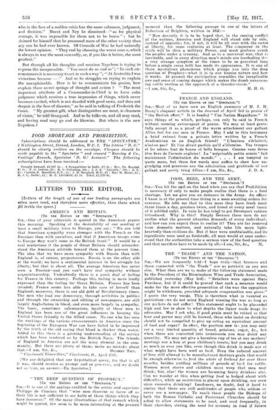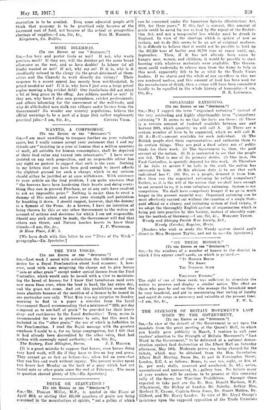THE " TRADE " AND THE NATION.
[To THE EDITOR OF THE " SPECTATOR."] SIR,—We are frequently told—I hope truly—that brewers and those connected with " the Trade " are as patriotic as any one else. What then are we to make of the following statement made by the President of the Birmingham Wine and Trade Association, published yesterday (May 3rd) : " Retailers were against State Purchase, but if it could be proved that such a measure would make for the more effective prosecution of the war the opposition might be withdrawn, provided adequate compensation was given." I quote the very woods. This is therefore what is vaunted as patriotism—we do not mind England winning the war so long as our pockets do not suffer ! This statement ought to be placarded high and low to show to what depths the liquor trade drags its advocates. May I ask why, if good grain must be ruined so that beer and porter may still be brewed, those who insist on drinking should not be compelled to give up eating an equivalent amount of food and sugar? In effect, the position now is : you may only cat a very limited quantity of bread, potatoes, sugar, &c., but when these are converted into intoxicants you may drink any quantity. We may not give a harmless cup of tea at our mothers' meetings nor a bun at poor children's treats; but you may drink as much as ever you like, even though this drink is made out of what might have been used as food. Even the reduced amount of beer still allowed to be manufactured destroys grain that would be enough otherwise to feed the whole of Ireland for over three months, besides yielding millions of pounds of focd for cattle. Women must starve and children must weep that men may drink; but, alas! the women are becoming heavy drinkers also. Can we wonder at this when getting food is hedged about with difficulties, while no restriction is placed upon drinking, nor even upon excessive drinking? Londoners, no doubt, find it hard to realize that there are still multitudes of people who seldom or never see a newspaper. To reach these people the Bishops of both the Roman Catholic and Protestant Churches should be asked to allow statements to be read, and read frequently, in their churches, stating the need for economy in food if future
starvation is to be avoided. Even. some educated people still think that economy Is to be practised only because of the increased cost of food, not because of the actual or prospective
shortage of supplies.—I am, Sir, &c., Root M. BARRETT.
Kingstown, Co. Dub/in. ,



























 Previous page
Previous page